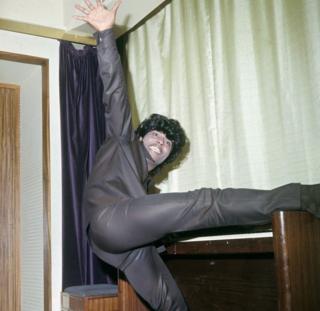 Image copyright Getty Images
Image copyright Getty Images"A-wop-bop-a-loo-bop, A-lop-bam-boom!"
Sixty-five years ago, "Little" Richard Penniman walked into J&M Studios in New Orleans and set about recording some new music for Speciality Records.
By this stage, he'd been in the business for four years, trying and failing to record hits for the rival labels RCA and Peacock. By all accounts, the session on 14 September 1955 wasn't about to reverse his fortunes.
After an unproductive morning in which five mediocre gospel songs were committed to tape, producer Bumps Blackwell called proceedings to a halt and, as legend has it, the musicians decamped to a nearby bar.
There, Little Richard spotted a piano and, more importantly, an audience. The 22-year-old sat down and played an old, slightly obscene ditty he'd often performed as filler when he played nightclubs.
"He hit the piano and hollered, 'A-wop-bop-a-loo-bop-a-good-God-damn!'" Blackwell later recalled. "And those were the cleanest words of it".
Despite the lyrics - which were essentially a tribute to anal sex - the bar went wild, and Blackwell knew he had a hit on his hands.
The words were hastily rewritten by local musician Dorothy LaBostrie, who replaced "good booty" with "aw rootie", a slang version of "all righty." Other provocative lines were sanitised with references to girls named Daisy and Sue.
That ecstatic, rhythmic, a capella intro remained almost entirely intact, though, with only the blasphemous portion excised.
But what does it mean?
Most people assume it's a load of old codswallop-a-lop-bam-boom - an outlet for the primal, pent-up energy that erupted from Little Richard's soul every time he sang.
An alternative theory is that the cry is actually a vocal approximation of a drum break, making Little Richard one of the earliest beatboxers on record.
But speaking to Rolling Stone magazine in the 1970s, the star said the phrase actually started out as a sneaky way of cursing at his boss.
"I was working at the Greyhound bus station in Macon, Georgia," he recalled, "and I couldn't talk back to my boss, man.
"He would bring all these pots back for me to wash, and one day I said, 'I've got to do something to stop this man bringing back all these pots to me to wash,'" he recalled.
"And I said, 'A-wap-bop-a-lup-bop, A-wop-bam-boom, take 'em out!' and that's what I meant at the time.
"So I wrote Tutti Frutti in the kitchen, I wrote Good Golly Miss Molly in the kitchen, I wrote Long Tall Sally in that kitchen."
Even after the record sold a million copies, Little Richard believed in the phrase's anti-establishment potency.
He even claimed to have shouted it in the face of former Alabama governor George Wallace, a staunch segregationist who Martin Luther King once referred to as "perhaps the most dangerous racist in America today".
Little Richard's verbal attack made little impact, however. "He didn't know what I meant… and neither did I," the singer recalled.



 Africana55 Radio
Africana55 Radio 
